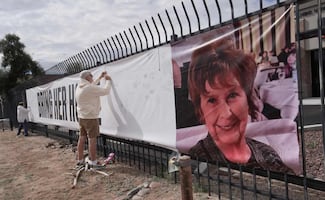Más Información

Libros de texto cimentaron una educación colonial y eurocentrista: Nadia López; esta es su tesis sobre pueblos afrodescendientes

Cronología del caso Javier Duarte, el rostro del “nuevo PRI” presumido por Peña; así fue la caída del exgobernador de Veracruz

FBI investiga posible traslado de Nancy Guthrie a México, reporta TMZ; autoridades habrían contactado a fuerzas federales mexicanas

Monreal habla sobre licencia de Sergio Mayer para asistir a reality show; “no deja de tener el cargo”, dice Kenia López
The assassination attempt against Venezuelan President Nicolás Maduro has once more raised the question of his government’s survival, amid new opposition efforts to consolidate a united front and a rampant economic crisis that is ravaging the South American nation.
After some 20 alleged coups and failed attacks against Maduro since he came to power in 2013 as the 63rd President of Venezuela replacing the late revolutionary leader Hugo Chávez , according to his own count, the international community has received with skepticism last Saturday’s events in Caracas during a parade marking the 81st anniversary of the Bolivarian National Guard .
Although there is recorded evidence of the moment when a loud explosion interrupted Maduro’s speech, followed by the reaction of his security detachment, it is not yet clear if several drones were used, as it was claimed by an unknown military dissident group calling itself National Movement of Soldiers in T-shirts .
By a statement passed to and read by Patricia Poleo , a Miami-based YouTube agitator with close links to the right-wing Venezuelan opposition—a move that immediately fueled the regime arguments denouncing a murder attempt—the group said that army snipers guarding the parade destroyed the explosive-laden drones , yet it warned that the next action will be successful.
Last year, amid deadly, near-daily protests, rogue police officer Óscar Pérez flew a stolen helicopter over the capital and launched hand grenades at government buildings. Pérez and several comrades were killed in a gunbattle with police after more than six months at large.
This time, United Nations Secretary-General António Guterres rejected “any act of violence” in Venezuela, and again urged national actors “to make all efforts to seek consensus to address the country’s many challenges, upholding the human rights of all Venezuelans and within the framework of the rule of law.”
In contrast, the outgoing Mexican government of President Enrique Peña Nieto , the main sponsor of a hard line towards Caracas in the Organization of American States ( OAS ) with the United States and Colombia in the last years, remained in silence. The bilateral relationship is virtually frozen, after Mexico and its allies from the Lima Group did not recognize Maduro’s victory in the 20 May 2018 elections.
Opposition concerns
Inevitably, the Venezuelan opposition expressed its concerns about a government crackdown using as a pretext for Saturday’s events that left seven soldiers injured.
National Constituent Assembly leader
, Diosdado Cabello , said the thwarted attack “goes beyond any limit of rationality” and demanded, “justice in order to have peace.”
Maduro also blamed Colombian President Juan Manuel Santos , whose second four-year period finished on Tuesday, while White House National Security advisor John Bolton claimed: “there was no U.S. involvement.”
However, the Bolivarian revolution has been in Washington’s hit list since the U.S. Navy cooperated with the coup leaders that briefly removed Chavez in 2002.
More recently, former State Department Secretary , Rex Tillerson , agreed in a press conference with his Argentine colleague Jorge Faurie on promoting regime change.
For its part, U.S. President Donald Trump made headlines after Latin American diplomats leaked to the press his military threats to intervene in Caracas.
Last Tuesday, Peruvian journalist Jaime Bayly revealed that he was present at a meeting with the coup plotters in Miami prior to the assassination attempt, and confirmed two drones were used disguised as state television cameras, yet the devices lost the remote control signal—probably due to electronic countermeasures —when they approached Maduro, his wife Cilia Flores and their entourage.
Either way, due to falling oil prices and the incompetent government policies , Venezuela is verging on the status of a failed state.
The situation has been made worse by sanctions denying access to U.S. capital markets.
Several executive orders were signed by Trump in the last months, including one designed to destroy the Petro digital currency engineered for oil transactions with Russian assistance.
The attack against Maduro happened three days following his announcement of a new gasoline policy , which itself took place during a power outage that left Caracas in darkness for hours.
Even though the country has the largest oil reserve in the world , estimated at more than 300 billion barrels—Venezuela has 513 billion additional barrels locked up in the Orinoco Belt oil sands —, most of the fuel needs to be imported because the oil industry is faltering.
This week, the opposition-held National Assembly , the unicameral legislative body replaced by the new Parliament in 2017, reported an inflation rate of 125% on July and added that every 26 days the prices are doubling.
Venezuela should expect inflation this year to reach 1000,000% according to the International Monetary Fund .
In an effort to strengthen the fight against the reelection of Maduro, the opposition created on March the Broad Front Free Venezuela , a coalition composed of moderate and right-wing parties, non-governmental organizations, unions, representatives of the Catholic Church and civil society intending to draw more international attention to the nation’s crisis.
The new platform was presented by the Democratic Unity Table ( MUD ), which boycotted the elections.
Edited by
More by
Noticias según tus intereses
[Publicidad]
[Publicidad]









